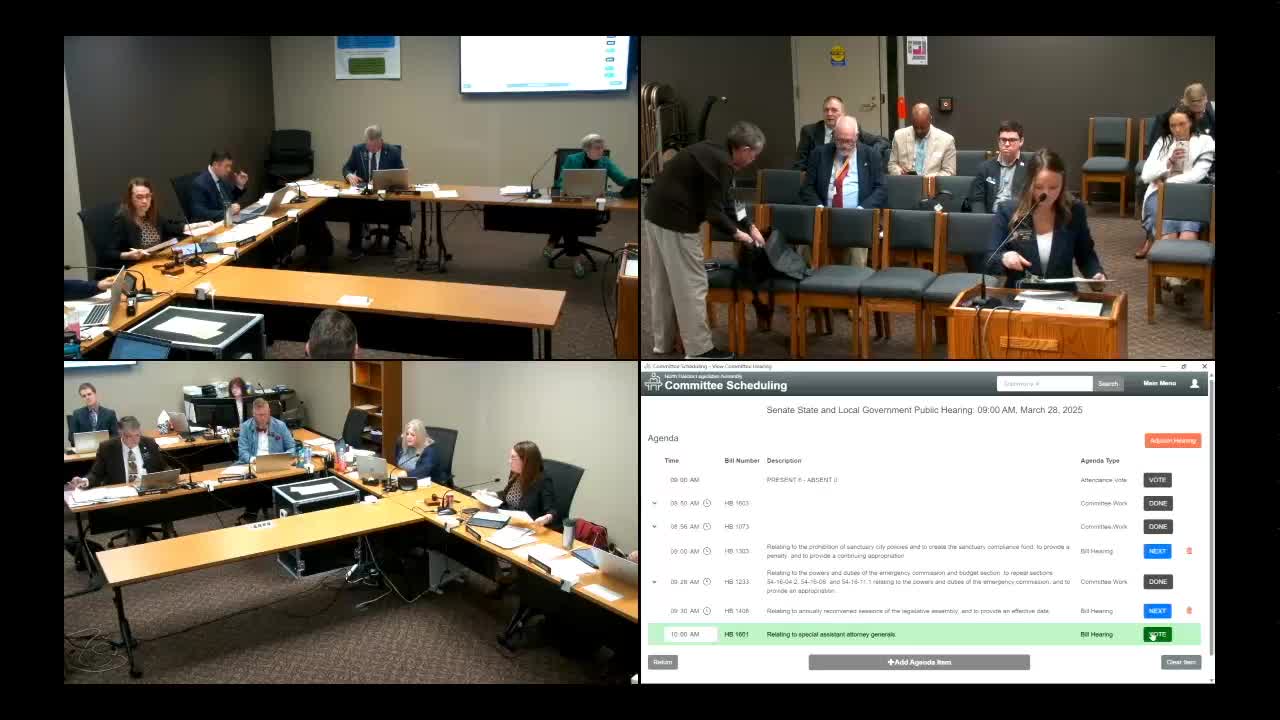Committee hears divided testimony on House Bill 1601 to change special assistant attorney general appointments
Get AI-powered insights, summaries, and transcripts
Subscribe
Summary
House Bill 1601, to limit or alter how state agencies’ attorneys are designated as special assistant attorneys general, drew support from several constitutional officers and agencies and strong opposition from the Attorney General’s office. The committee closed the hearing without adopting a recommendation.
Representative Emily O’Brien introduced House Bill 1601, which would change the rules around special assistant attorney general (SAG) appointments and revocations for attorneys employed by state agencies and certain elected offices. "This legislation is not just a matter of administrative efficiency, it's about protecting the integrity of state government, ensuring accountability, and upholding the separation of powers," O’Brien said at the start of testimony.
Supporters — including the Department of Water Resources, the governor’s general counsel, and elected constitutional officers — argued the bill would protect the independence and continuity of legal counsel for agencies and constitutional offices. Rhys Hoss, director of the Department of Water Resources, testified the department needs specialized in‑house expertise in water law, noting DWR was reorganized in 2021 and provides staff support to the State Water Commission. "What we're really asking for is that we also have access to specialized expertise in house that would specialize specifically in water law," he said. The governor’s general counsel, Chris Joseph, said the governor’s office supports the bill, while Insurance Commissioner John Godfrey argued the measure corrects a structural flaw that can create divided accountability for agency legal counsel.
Opposition focused on constitutional authority and oversight. Claire Ness, chief deputy attorney general, testified on behalf of the Attorney General and said the office opposes the engrossed bill and proposed a compromise amendment. Ness explained the statutory SAG appointment is the attorney general’s delegation of constitutional authority and warned the bill as written would force future attorneys general to irrevocably cede that authority. She described the current standard allowing revocation "for good cause" and said revocations are rare; she noted only one recent revocation had arisen after career staff and risk management raised competency and ethical concerns. "As a constitutional officer and as a steward of the office of attorney general, attorney general Wrigley opposes engrossed house bill 16 o 1," Ness said.
Representative O’Brien described two amendments she brought: one to require revocation only for good cause and upon request of the employing entity, and a second version that would add the ethics commission to the list of covered entities. The Attorney General’s office offered an alternate amendment requiring consultation with the employing agency before a revocation, while retaining the good‑cause standard.
Committee action: The committee heard extensive pro, neutral and opposition testimony and closed the hearing without a committee vote or final action. Members said the issue raises constitutional and structural questions that merit further review.
Next steps: The committee did not adopt a recommendation; members indicated more work on amendment language and interagency consultation will be necessary before a formal committee vote.
